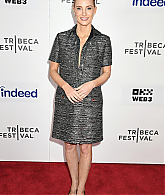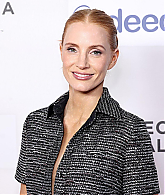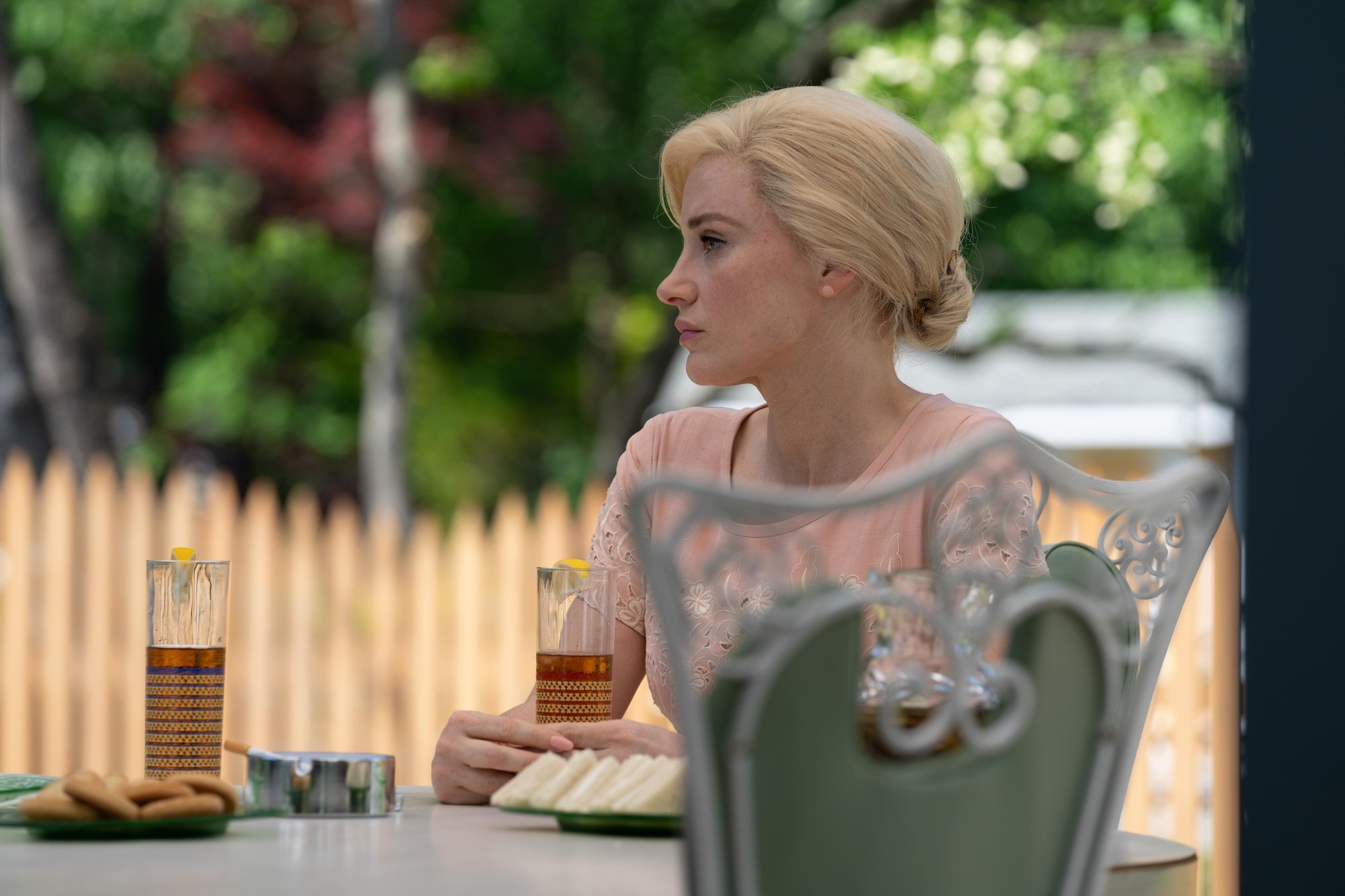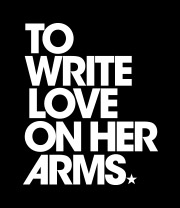 elcome to Jessica Chastain Network, your oldest and most complete resource dedicated to Jessica Chastain. You may better remember her as Molly Bloom in Molly's Game or Maya in Zero Dark Thiry. Academy Award winner for The Eyes of Tammy Faye, Jessica spans her career from big to small screen, seeing her not only in movies like The Help, The Debt, Miss Sloane, Woman Walks Ahead, The Zookeeper's Wife, The Good Nurse, she also played some iconic roles for series like Scenes from a Marriage and George & Tammy. Recently she registered a podcast series, The Space Within, and had a role in Memory and Mothers' Instinct. This site aims to keep you up-to-date with anything Mrs. Chastain with news, photos and videos. We are proudly PAPARAZZI FREE!
elcome to Jessica Chastain Network, your oldest and most complete resource dedicated to Jessica Chastain. You may better remember her as Molly Bloom in Molly's Game or Maya in Zero Dark Thiry. Academy Award winner for The Eyes of Tammy Faye, Jessica spans her career from big to small screen, seeing her not only in movies like The Help, The Debt, Miss Sloane, Woman Walks Ahead, The Zookeeper's Wife, The Good Nurse, she also played some iconic roles for series like Scenes from a Marriage and George & Tammy. Recently she registered a podcast series, The Space Within, and had a role in Memory and Mothers' Instinct. This site aims to keep you up-to-date with anything Mrs. Chastain with news, photos and videos. We are proudly PAPARAZZI FREE!

 elcome to Jessica Chastain Network, your oldest and most complete resource dedicated to Jessica Chastain. You may better remember her as Molly Bloom in Molly's Game or Maya in Zero Dark Thiry. Academy Award winner for The Eyes of Tammy Faye, Jessica spans her career from big to small screen, seeing her not only in movies like The Help, The Debt, Miss Sloane, Woman Walks Ahead, The Zookeeper's Wife, The Good Nurse, she also played some iconic roles for series like Scenes from a Marriage and George & Tammy. Recently she registered a podcast series, The Space Within, and had a role in Memory and Mothers' Instinct. This site aims to keep you up-to-date with anything Mrs. Chastain with news, photos and videos. We are proudly PAPARAZZI FREE!
elcome to Jessica Chastain Network, your oldest and most complete resource dedicated to Jessica Chastain. You may better remember her as Molly Bloom in Molly's Game or Maya in Zero Dark Thiry. Academy Award winner for The Eyes of Tammy Faye, Jessica spans her career from big to small screen, seeing her not only in movies like The Help, The Debt, Miss Sloane, Woman Walks Ahead, The Zookeeper's Wife, The Good Nurse, she also played some iconic roles for series like Scenes from a Marriage and George & Tammy. Recently she registered a podcast series, The Space Within, and had a role in Memory and Mothers' Instinct. This site aims to keep you up-to-date with anything Mrs. Chastain with news, photos and videos. We are proudly PAPARAZZI FREE!
How Jessica Chastain Is Changing the Hollywood Game
Leslie Bennetts
January 17, 2018
Article taken from The Wall Street Journal.
In Aaron Sorkin’s directorial debut, Chastain tackles a challenging role—one that’s helping to redefine the rules for women
In the opening moments of the gripping new movie Molly’s Game, a world-class skier has a traumatic accident that ends her athletic career. Armed only with steely defiance, Molly Bloom is soon running a notorious poker game that makes her millions of dollars, triggers an FBI investigation and endangers her life.
As Molly, Jessica Chastain delivers an unforgettable performance that earned her a Golden Globe nomination for best performance by an actress in a motion picture. The movie was written and directed by Aaron Sorkin, who was nominated for best screenplay. But neither of them dreamed up the film’s heroine—a real-life entrepreneur who recounted her adrenaline-fueled journey in the 2014 memoir called Molly’s Game: From Hollywood’s Elite to Wall Street’s Billionaire Boys Club, My High-Stakes Adventure in the World of Underground Poker.
Although she had lived the story, Bloom was stunned by the character Chastain created on camera. “I was blown away,” says Bloom. “To see how powerful Jessica is and how nuanced she is in communicating the things I was feeling—I just thought she was incredible. My family and close friends were like, ‘It was like watching you on-screen.’ ”
Achieving that effect was a formidable challenge. “The role of Molly is really complicated; she’s got all kinds of different sides to her. Jessica just took it like a piece of meat and ate it,” says Melissa Silverstein, the founder of Women and Hollywood, an initiative that advocates for gender equity in the entertainment industry and named Chastain as a co-chair for its 10th anniversary celebration last fall. “I feel like she’s her generation’s Meryl Streep,” Silverstein adds.
Sorkin credits much of the story’s impact to his 40-year-old star. “Jessica straps the movie to her back in the first scene, runs a full sprint and doesn’t let it off her back until the end credits roll,” he says.
Although Sorkin is a longtime screenwriter, producer and playwright whose credits include his Academy Award–winning screenplay for The Social Network, Molly’s Game is his directorial debut. Its timing was prescient, given the current firestorm over male abuses of power and the impossible dilemmas they pose for women; as a competitive skier, Bloom was coached by her authoritarian father, and her subsequent career as a poker impresario exposed her to brutal adversaries like the mob enforcer who inflicted a savage beating and shoved a gun in her mouth.
“To me, this story is a lot about patriarchy,” Chastain says over coffee in a Midtown Manhattan hotel near her apartment. “We do live in a patriarchal society. It means that men make all the rules. Molly’s father is the moral authority of the household, and you weren’t allowed to be a separate human being from his viewpoints. And, of course, in her business, the men were always trying to control the industry around her.”
Molly’s challengers include Player X, a composite character that was reportedly based in part on Tobey Maguire, Ben Affleck, Matt Damon, Leonardo DiCaprio and other movie stars who frequented the exorbitantly expensive insider’s club known as “Molly’s game.”
“Player X is constantly trying to take away her business, and she’s trying to learn to play by his rules,” Chastain explains. “What was really upsetting to her was that there was no justice, no sense of right or fairness. The players were all men, and the rules would change based on the unfair whims of men. That’s a line Aaron Sorkin has in the movie, and I remember when I read the script, I was like, ‘What? Where has this writer been all my life?’ ”
At its core, the film is about power and the unequal ways that each gender is able to use it, with women subject to constraints and penalties that don’t burden their male counterparts. “Molly spends the movie surrounded by powerful men, and when she makes one of those men feel less powerful, the man has to banish her,” Sorkin observes.
Strikingly, however, the movie does not offer romantic love as the ostensible solution to a woman’s problems—a noteworthy choice for a story that revolves around a female star. When the FBI investigation into her business results in criminal charges, the prosecution leads to an unexpected intimacy between Molly and her lawyer, who is alternately exasperated and dazzled by her intransigence about the case. As played by Idris Elba, he’s such a sympathetic character that viewers may expect Molly to end up in his arms—as did Chastain: “It’s a female protagonist, and society has been conditioned that a woman needs to be in a relationship in order to be complete.”
But Molly’s Game is the anti-rom-com. “I was excited about the romantic and sexual chemistry the two of them would bring to their scenes, but for me, the relationship they develop is more interesting and less expected than a sexual relationship,” Sorkin explains.
Navigating life-or-death challenges without sacrificing her independence, sexuality or principles, the character of Molly as portrayed by Chastain represents such a departure from conventional gender stereotypes that its impact is startling. How is it possible that watching such a fierce screen heroine feels like a revolutionary experience? The hero who goes it alone, defies convention and breaks the rules while maintaining his basic integrity is a familiar male archetype—but it still seems thrillingly subversive to see a sexually desirable, thoroughly bad-ass woman go after money, power and success while avoiding romantic entanglements. “Molly’s character is as old as drama itself—we’re just not as used to seeing that character be a woman,” Sorkin observes.
The audience’s gender expectations are so ingrained that reversing the usual roles has a disproportionate impact. “This is about a woman just being fearless and going for it; it’s not about how men are going to save her,” says Silverstein. “That’s what makes it so liberating. We’re ready to see women as the heroes of their own story.”
Chastain is a strong advocate for gender equity in Hollywood, where women have routinely suffered egregious disparities in pay as well as other forms of power and representation. “I’m not taking jobs anymore where I’m getting paid a quarter of what the male co-star is being paid,” Chastain said last year. “Women need to step forward and demand they’re fairly compensated for their work.”
But when she started speaking out, first about equality issues and then about the sexual harassment scandals in Hollywood, she was afraid her assertiveness might damage her career—a concern that made her Golden Globe nomination doubly meaningful. “To be honest, I’m mainly surprised,” she told the New York Times in December. “I have a lot of fear, thinking that if I speak my mind…am I going to be made to disappear in my industry?”
When asked what her personal experience of patriarchy has been, Chastain responds with a small, mirthless smile. “I mean, it’s every experience for me, so I don’t know how to separate anything,” she says. “When you have one demographic that is in charge of another demographic’s livelihood, you’re always going to have abuse of power.”
In the movie, Molly uses ample cleavage, plumped-up lips and showy makeup to help her manipulate men; her appearance evolves into what another character refers to as “the Cinemax version” of her original self. In person, the russet-haired Chastain looks far more elegant and refined; wearing subtle makeup, a black-and-white tweed sheath dress and black leather jacket, she is impeccably chic.
“Why do women have to present themselves in a sexually desirable way in order to be heard?” Chastain asks. “I really wanted to show that she had to give away a lot of who she was in order for people to listen to her. If you’re presenting yourself in a sexually desirable way, men feel like there’s a bit of flirtation and they could have her if they wanted to. And when they feel like they can’t, that’s when they feel threatened. There was a sense that they had to possess or own her.”
Chastain is painfully familiar with the universal female challenge of deflecting men’s sexual expectations without alienating them. “I used to wait tables, and the male patrons at the restaurants would be very inappropriate with me,” she recalls. “I definitely have had men grab me; I don’t know if there’s a woman on this planet who has not. There are a lot of really good men out there, but we live in a society where making sex jokes or talking about a woman’s body has been normalized to be perceived as a compliment and something a woman should feel good about—when in reality, [if] it’s a professional environment, there should be better, clear boundaries. But if I told every man who I was serving at a restaurant to stop being inappropriate, I wouldn’t make money for my rent.”
Like many actresses, Chastain has tangled with Harvey Weinstein; she refused to cooperate when he pressured her to wear clothing designed by his wife to an event. He later introduced Chastain at a premiere of The Disappearance of Eleanor Rigby, which was distributed by the Weinstein Company. “He actually told the audience, ‘If I had to get in a boxing ring with Muhammad Ali or Jessica Chastain, I would choose Muhammad Ali,’ ” Chastain reports.
Like Bloom, Chastain endured an upbringing that bred toughness and resiliency. But Bloom’s Colorado childhood was one of discipline in a punishing schedule controlled by her dictatorial father, whereas Chastain’s early years were spent in California without a father, in an atmosphere of insecurity. “My mom was a single mom; I don’t know who my biological father is, and I grew up in a household that was really financially unstable,” she says. “We moved quite a bit, we were evicted, and there were times when we were living with my mom’s friends. I saw how much she struggled. Whenever a man would come into the household, it would usually lead to some sense of financial upheaval.”
Chastain had to depend on herself to draw any necessary boundaries. “There was a turning point in my life where we were living with someone I didn’t like very much, a boyfriend of my mom’s,” she recalls. “And he did something—my room was messy or whatever and he had taken my clothes, and I was telling him to give me back my stuff—and he slapped me. And I just kicked him in the genitals, and he fell to the ground immediately. It was me, my sister and my brother—and I remember looking at my sister’s face, and we were both like, ‘Oh, my God, what did I just do?’ And then I ran out of the house. But I always look back on that moment as knowing that, OK, if anything happens to me, I’m capable of fighting back.” Her retaliation had the desired effect. “He never messed with me again,” she says. “If you allow a bully to intimidate or victimize you, they’ll continue to do it. Bullies are actually weak; they don’t go after strong people.”
Economic insecurity taught Chastain other lessons. “I came from a family with no money, and I’m sure it provided the work ethic,” she says. “I knew that no one was going to give me anything for free.”
Chastain’s colleagues on Molly’s Game were particularly grateful for her conscientiousness. “She’s such a hard worker, and she accepted the incredible amount of rehearsal we had to do to pull off the dialogue and 10-page scenes,” says Idris Elba. “The experience was unique because we had 45 pages to shoot in 10 days, which is more than what I shoot on an episode of Luther shot in four weeks.”
But Chastain’s diligence has made her deeply averse to unnecessary risk. “I think that’s why I don’t like gambling,” she says. “I don’t want to leave anything up to chance. I don’t believe in that. I like to know, OK, if I show up to work and I work 10 hours and I make this much money an hour, I’m going to get this much money at the end of the day. I like that structure. Molly said recently that someone lost $100 million at her table. I just can’t even.…”
Chastain discovered the job she wanted at the age of 7, when her maternal grandmother took her to a production of Joseph and the Amazing Technicolor Dreamcoat. “I didn’t really have a creative outlet,” Chastain says. “And it wasn’t until I went to this play and I saw that this is what people do for a living [that] I was like, ‘Oh—this is what I’m going to do!’ ”
Her family finally entered a more stable era when her mother married a firefighter while Chastain was in the eighth grade. “My stepfather is my father,” she says. “I call him my dad. Family to me is emotional; it doesn’t necessarily mean you’re related by blood. It’s more of a spiritual thing where you’ve been searching for years for this person that your soul connects to.”
Thanks to a biannual scholarship funded by Robin Williams, Chastain was able to attend Juilliard, graduating in 2003. Her career began to take off three years later, when Al Pacino cast her in the title role of Oscar Wilde’s Salome—first in his stage production, then in a film of the play. She credits Pacino as a crucial mentor. “I call him my acting godfather,” she says.
In the past few years, Chastain has leapt to the top of her profession. In 2012, she was nominated for an Academy Award for best supporting actress for her role as Celia Foote in The Help and made her Broadway debut in The Heiress. In 2013 Chastain won a Golden Globe and earned an Oscar nomination for best actress for her performance as a CIA agent in Zero Dark Thirty.
As her career soared, Chastain’s ambitions did not include wedlock. “I never wanted to get married,” she says. Her childhood gave her ample evidence that finding a man was not the answer to the riddle of a woman’s life, and the last thing she envisioned for herself was a Disney -worthy fairy tale. But last June Chastain married her longtime boyfriend, Gian Luca Passi de Preposulo, a 35-year-old fashion executive from a noble Italian family. The wedding was held at the Villa Tiepolo Passi, a family estate in Treviso that dates from the 17th century. “When I first met my husband, he knew that marriage wasn’t something I was interested in,” Chastain says. “And then as we got to know each other, the idea of marriage shifted for me. There are some things worth celebrating—and he’s worth celebrating. I actually love being married. I never thought I would, but this is a spectacular human being, and I am celebrating that I get to share my life with him.”
Chastain deflects questions about whether she hopes to have children, and her professional choices attest to her interest in exploring a wider range of possibilities for women than motherhood. She started her own production company, Freckle Films, to help create “opportunities for women in front of and behind the camera,” she says, and she has become an outspoken critic of all forms of sex discrimination. “It’s another form of bullying,” she says. “But people are starting to wake up, and the inequality is becoming really clear. We need to look at ourselves and say, ‘What can we do to move the needle in a positive direction?’—because being normalized to inequality isn’t good enough anymore.”
In the long run, Chastain’s creative choices may have an even greater impact than advocacy. “Jessica is really trying to use her platform to make change—and she has the power now to do that,” says Silverstein. “We need to live in a world where it’s not taken as a given that women are serving men, and Jessica is looking to tell the kind of women’s stories where the woman is front and center in the action. She’s playing people who are rebels in our culture.”
For Chastain, the bottom line is simple: Since men are allowed not to be defined by their relationships with women, she says, “I don’t think women should be defined by men.”






















